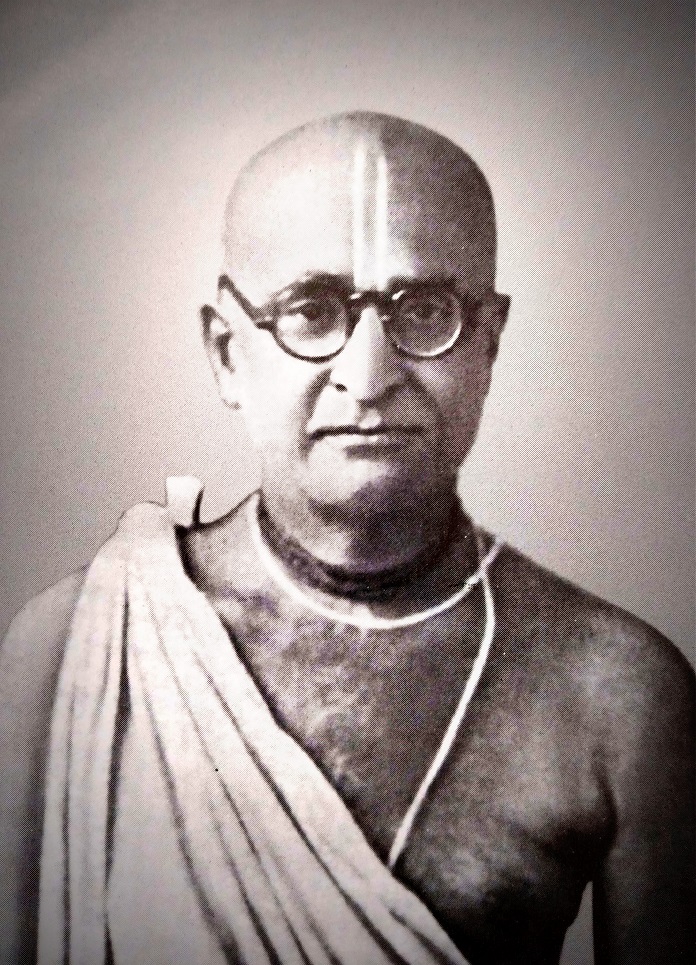
On the 6th of February 1874 AD at 3.30 pm in the afternoon, Bimala prasad Datta (later renowned as Srila Bhaktisiddhanta Sarasvati Thakura) appeared in this world, at a place not very far from the Jagannatha temple in Puri. He was the fourth son of Srila Bhaktivinoda Thakura and Srimati Bhagavati Devi. We have dedicated a separate article in honor of Srila Bhaktivinoda, who also happens to be an exalted acharya of our Vaishnava sampradaya. Sri Bimala Prasad Datta exhibited the thirty-two bodily symptoms of a great personality, at the time of his birth. He was born with his umbilical cord wrapped around his neck like a Brahmin’s thread, perhaps a sign of his glorious mission.
When Bimala Prasada was just six months old, Lord Jagannatha’s Rathayatra cart had halted in front of Srila Bhaktivinoda’s house in Puri for three continuous days. It was during the Rathayatra festival. The cart could not be moved. The cart began moving only after Bimala Prasad (Bhaktisiddhanta Sarasvati) was brought before Lord Jagannath. As soon as Bimala came out, a garland fell off from the Lord’s neck and encircled the child. This was accepted as a sign of special favor from the Lord. During Bimala’s grain ceremony, his vocational inclination was tested. The child immediately embraced Srimad Bhagavatam, indicating his future as a great preacher. On another occasion, Bimala Prasad was chastised by his father, when he was about to eat some freshly bought mangoes, which had not been offered to the Lord already. Bimala felt so guilty of this childish offense, that he vowed never to eat mangoes again. He stuck to his vow till the very end of his life. That was how highly he honored his commitments.
Bimala displayed his spiritual intent since his very childhood. Sri Bhaktivinoda Thakura had a house here in Calcutta, where he used to often reside with his family (refer – ‘Bhakti Bhavan : Srila Bhaktivinoda Thakura’s house in Kolkata’). During the construction of this house (renowned as Bhakti Bhavan), a deity of Lord Kurma was unearthed. Srila Bhaktivinoda entrusted this deity unto his son Bimala, who then began worshipping the deity regularly. This beautiful deity has been preserved till this day at Bhakti Bhavan and we consider ourselves exceedingly blessed to have been able to obtain His blissful darsana.
Education of Bhaktisiddhanta Sarasvati :
Sri Bimala Prasad was a brilliant scholar. Whatever he would read once, he could later recall with perfect clarity. He received education in Mathematics and astrology at Srirampur college. There his tutors were so amazed at his acumen, that they awarded him with the title ‘Siddhanta Sarasvati’. He was a regular at the weekly satsang classes provided by Srila Bhaktivinoda Thakura. He was very fond of Narottama Das Thakura’s Prarthana and Prema Bhakti Candrika. In 1892, taking an entrance examination, he entered the Calcutta Sanskrit College.As always, he excelled in his studies. During his student days, he wrote various essays on spiritual topics for various magazines. He was a scholar in astrology and published old astrological texts like Surya Siddhanta. He was offered a chair in astronomy at the University of Calcutta by Sir Ashutosh Mukherjee, but he declined it, considering it to be an impediment to his spiritual life. On the request of Sri Jagannatha Das Babaji (refer – ‘The Samadhi and Bhajana Kutira of Srila Jagannatha Das Babaji ,Navadvipa (Koladvipa)’) ,he composed Sri Navadvipa Panjika, a Krishna-ized almanac in which all the days,months and lunar fortnights were given the names of Vishnu.
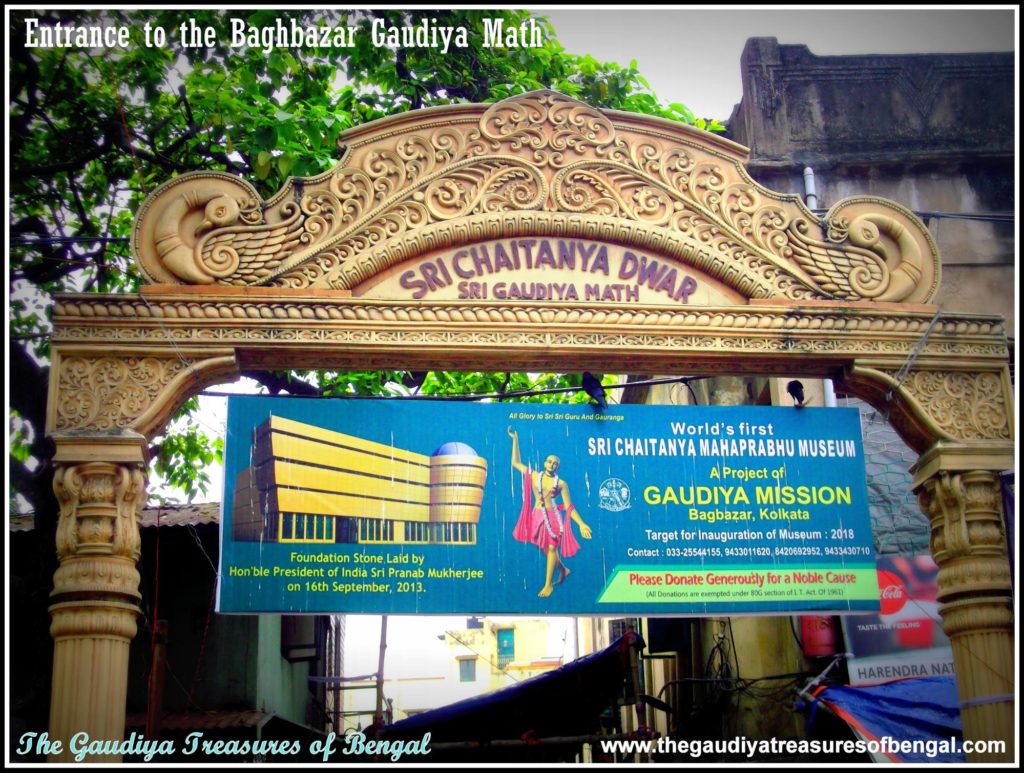
Post his college, Srila Bhaktisiddhanta was employed by the royal kings of Tripura from 1895 to 1905. He accepted the post of an editor and he edited a history of their family, which subsequently came to be known as Raj ratnakar. In 1905 he requested to be relieved of his duties, which he was granted along with full pension.
Sri Gaura Kishor Das Babaji accepts him as his disciple :
After the birthplace of Lord Chaitanya had been discovered (refer – ‘YogPeeth, Mayapur, Navadvipa – The birthplace of Sri Chaitanya Mahaprabhu’), Sri Jagannath Das Babaji and Sri Gaura Kishor Das Babaji came from Vrindavana to take darsana of Yogpeeth (Mahaprabhu’s birthplace in Mayapur). Sri Gaura Kishor Das Babaji was a Paramahamsa (exalted spiritual personality) of the highest caliber and Sri Bimala Prasad was drawn towards him since he had met with him. In the year 1900, Sri Bimala Prasad approached his eternal spiritual master, Sri Gaura Kishor Das Babaji, and expressed his eagerness to receive initiation from him. Initially, Sri Gaura Kishor Das Babaji declined, as he thought himself unsuitable to initiate a great scholar like Bimala Prasad. This act exhibited his utter humility.
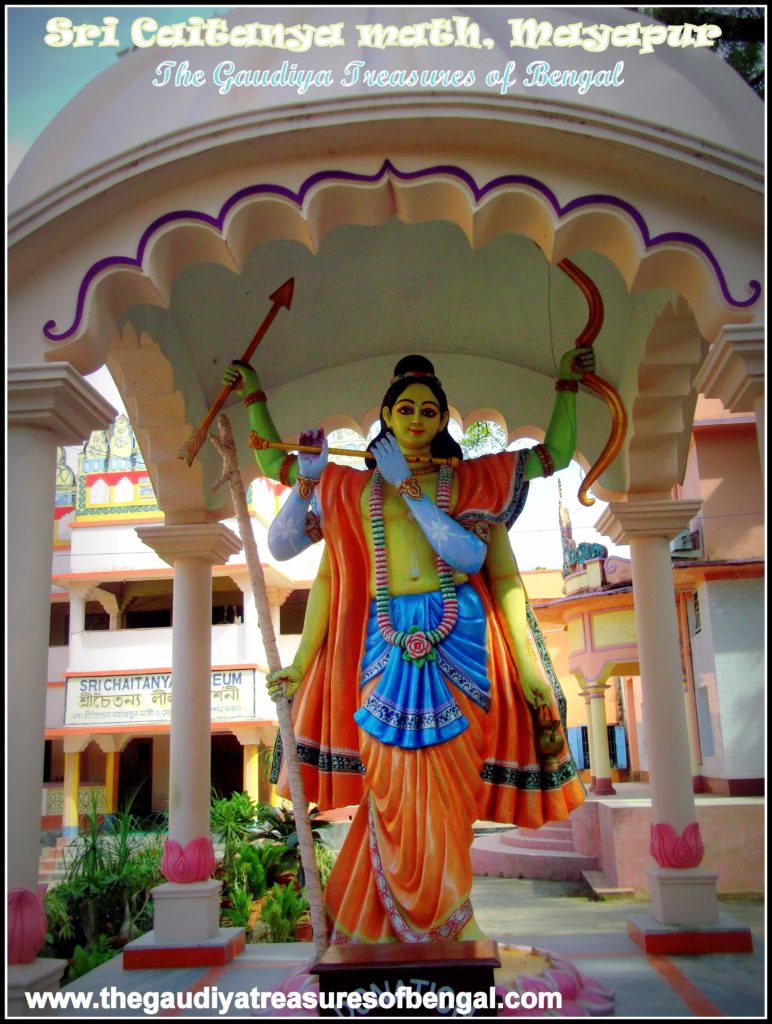
But on further insistence, Sri Gaura Kishor Das Babaji responded that he would need to ask for approval from Mahaprabhu. A few days later when Bimala did not receive a favorable reply, he decided to put an end to his life. Feeling compassionate, Sri Gaura Kishor Das Babaji finally decided to accept him as his disciple. After initiation Sri Bimala Prasad received his new name – Varsabhanavi devi dayita Das.
Severe Austerity and Sannyasa of Bhaktisiddhanta Sarasvati :
In the year 1905, at the age of 31, Srila Bhaktisiddhanta Sarasvati Thakura vowed to chant 3,00,000 holy names (192 rounds) a day. During these days, he used to stay at the house of Chandrasekhara Acharya (Mahaprabhu’s maternal uncle) in Mayapur and perform his intense spiritual routine. This is the same place where he had later constructed Sri Chaitanya Math (refer – ‘Sri Chaitanya Math , Sri Chandrasekhar Acharya Bhavan (Masir Bari), Mayapur, Navadvipa’). Srila Bhaktisiddhanta stayed for 9 years over here, executing severe austerities. He used to strictly follow his vows. Observing Chaturmasya, he used to cook rice in ghee and ate it from the floor in the manner of a cow. His spiritual master Srila Gaura Kishor Das Babaji Maharaja was very pleased to observe his renunciation and compared it with that of Srila Rupa and Raghunatha Das Goswamis. Srila Bhaktisiddhanta’s father, Srila Saccidananda Bhaktivinoda Thakura, one of the great acharyas himself, had brought up his son to be a dear servant of Mahaprabhu. When the roof of his small cottage got broken, Srila Bhaktisiddhanta didn’t waste time fixing it. Instead, using an umbrella, he continued with his chanting. We can go on and on discoursing the glories of our dear spiritual great grandfather, but we are inhibited considering the length of this article. In the year 1918, a few years after Srila Gaura Kishor Das Babaji had wrapped up his earthly pastimes, Srila Bhaktisiddhanta Sarasvati Thakura, at the age of 44, accepted his sannyasa initiation from a picture of Srila Gaura Kishor Das Babaji maharaja (his spiritual master), at the house of Chandrasekhara Acharya.
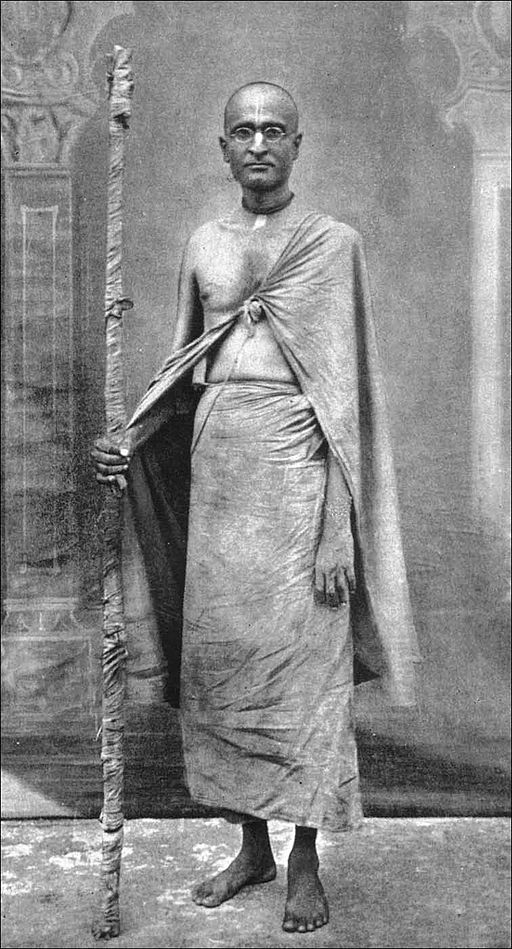
Though accepting sannyasa from the spiritual master’s picture was not as per any prevalent standards, the situation, in this case, was unique. Neither was Sarasvati Thakura’s spiritual master physically present nor did he have any other godbrother. Srila Bhaktisiddhanta decided that the time for widespread preaching had finally arrived.
Widespread preaching :
We would like to now briefly summarize the contributions and achievements of our beloved acharya. Srila Bhaktisiddhanta Sarasvati played a major role in debunking the strong-rooted influences of casteism and the polluted philosophy of the sahajiyas, which had by then, made deep inroads into the Indian society. He also took a strong stand against the mayavadis (impersonalists) and the atheists. Besides, he did a lot to unite the various Vaishnava sects by emphasizing the agreement shared by the four major Vaishnava Sampradayas ( Brahma, Rudra, Kumara, and Sri sampradayas). In his travels throughout India, he enjoyed the reputation of being a very strong debater. He was hence conferred with the title ‘Simha Guru’ (Lion Guru).
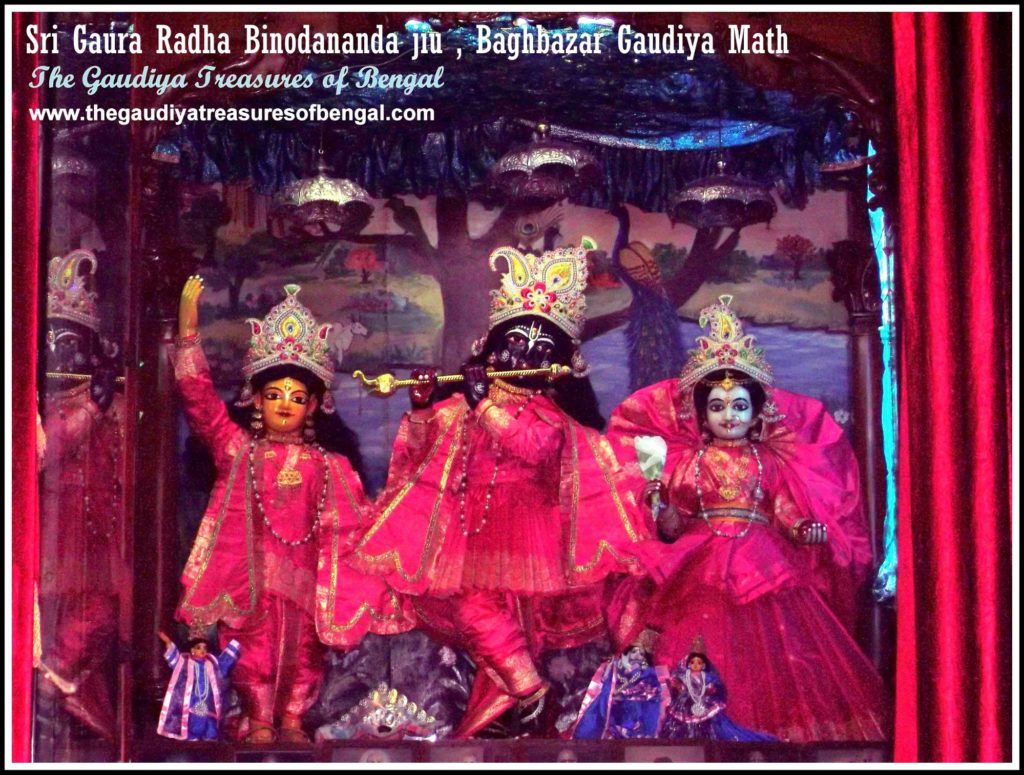
He had established 64 temples out of which 17 are located in Navadvipa Mandala (the nine islands of Navadvipa). Few of these were established outside of India as well – like the ones in Rangoon, London, and Germany. He was instrumental in printing thousands of books including a daily newspaper called the Nadia Prakash. He owned several printing presses, which regularly printed the spiritual following magazines – Sajjana Tosani (English monthly), The Gaudiya (official weekly journal of the Gaudiya Math), The Bhagavata (Hindi), Paramarthi (in Oriya), Kirtana (in Assamese). He had also published other books like – Bhagavad Gita with commentaries of the previous acharyas, Chaitanya Bhagavata with his own commentaries, Chaitanya Mangala, Chaitanya Caritamrta, Navadvipa Dhama granthamala, Chaitanya Chandramrta, etc. He established several significant parikramas like the Vraja Mandala Parikrama and the Navadvipa Mandala Parikrama. The erstwhile caste Goswamis (who claim their exalted status on account of their birth in the lineage of intimate associates of Lord Chaitanya), did not like his growing influence and even threatened him with his life. However, the Lord protected him at all times. Srila Bhaktisiddhanta was a Living encyclopedia possessing deep knowledge in Sanskrit, Bengali, English, Astronomy, etc. He was well versed with the teachings of scriptures having devoured and memorized several libraries. He was decorated with all the 26 qualities of a pure devotee.
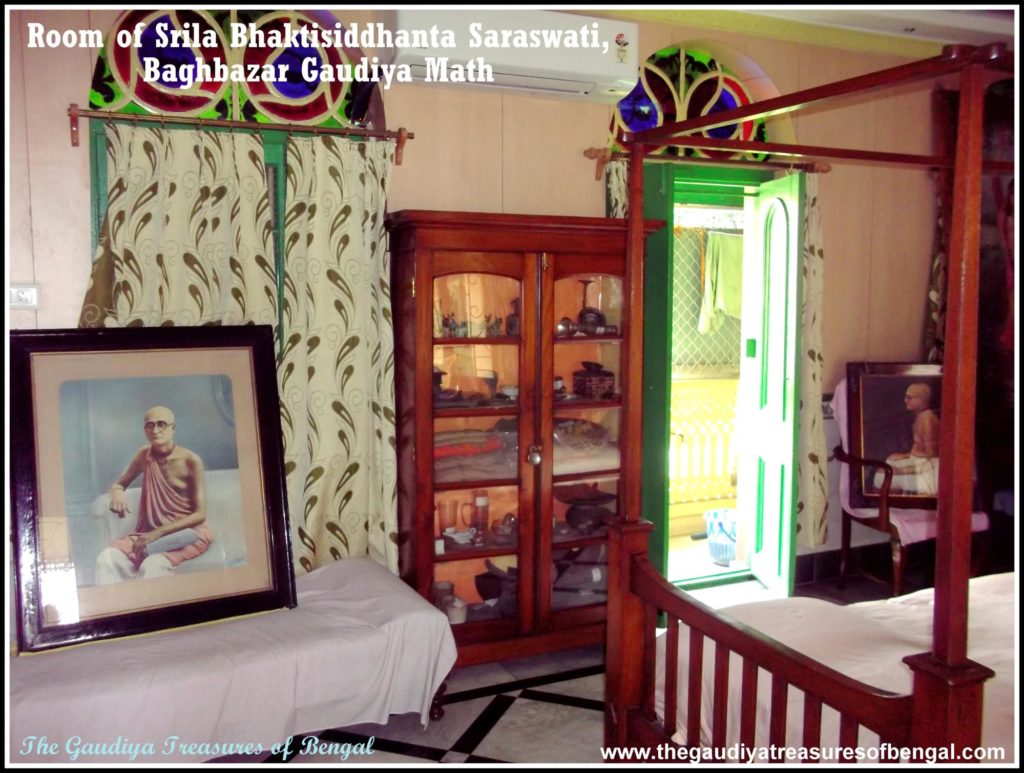
Srila Bhaktisiddhanta Sarasvati was a revolutionary acharya in many ways. Although Sannyasis (renounced) traditionally never used any conveniences for travel except for ox carts, Srila Bhaktisiddhanta used to ride in motor cars, motorized boats, etc. He also sent out his disciples across the seas to preach the timeless message of Lord Chaitanya. He even utilized radio for broadcasting the message of Godhead. All these reforms and innovations, however, were strictly to preach and engage more people in Krishna consciousness. His renunciation (yukta vairagya) was the type described by Srila Rupa Goswami wherein one engages everything (all modern facilities) fully in the service of Sri Krishna. On being asked about his spiritual master, Srila A.C Bhaktivedanta Swami Prabhupada had once exclaimed- ‘ What can I say? He was a Vaikuntha Man !’
Disappearance pastimes:
On January 1st, 1937, at about 5.30 AM, Srila Bhaktisiddhanta Sarasvati Thakura manifested his disappearance from this world and entered into the eternal pastimes of the Lord. He spent his final days at the Baghbazar Gaudiya Math. The day before he passed away, he had instructed his dear disciple Sripada B.R. Sridhara Maharaja to sing Sri Rupa Manjari pada and another disciple, Sri Navin Vidyalankar, to recite the siksastakam (instructions of Chaitanya Mahaprabhu). His transcendental body was worshipped and carried by road to Mayapur. A huge crowd of people had gathered while his body was being taken away. He was subsequently placed into samadhi at Chaitanya Math, the place where he had once executed his severe austerities.